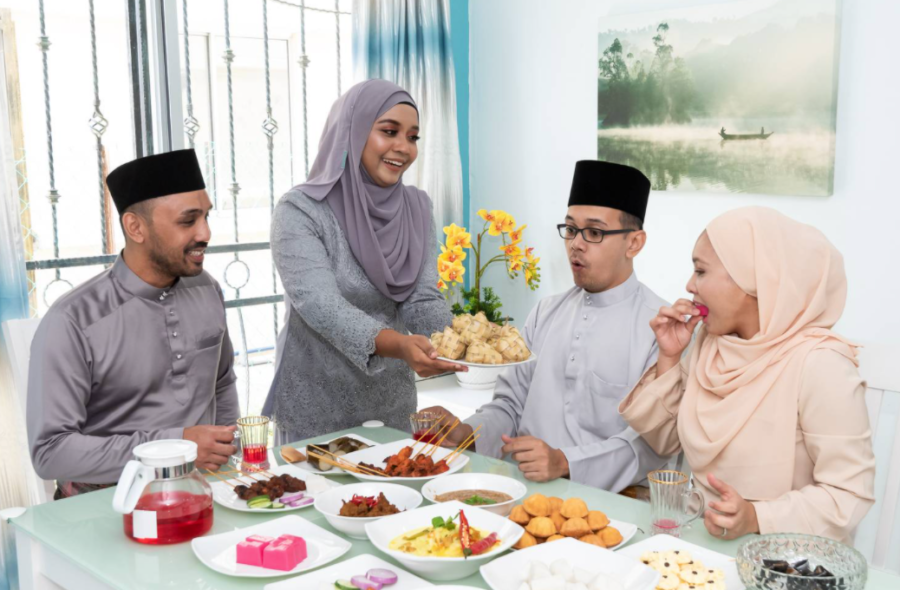
Resources, support grow for Japan’s Muslims
Renewing focus on their faith and spiritual life, Muslim communities around the world have spent the past month fasting and praying during Ramadan, the ninth month in the Islamic calendar. The end of this period is marked with a joyous celebration known as Eid al-Fitr, which means “the Festival of Breaking the Fast” in Arabic. This year it will be observed from sundown on May 1, with celebrations generally lasting two to three days, depending on the country.
Although celebrations to mark Eid al-Fitr vary widely around the world, they usually include prayers at a mosque followed by a feast with family and friends, whether in an intimate gathering at home or with the wider community. It is a special time of dressing up in one’s best clothes to greet friends and to pay respects at the graves of relatives. Gifts are often given, particularly to children, who may receive new clothes, accessories or toys. Eid al-Fitr is also an occasion for charitable giving and showing support for those in need.
The past two years of the pandemic have been challenging for Japan’s international residents, many of whom have found it difficult to travel to visit loved ones in their home countries. Against this background, sharing and celebrating special times takes on even greater significance and the members of Japan’s Muslim community have been looking forward to connecting with one another during Eid.
Tokyo Camii is Japan’s largest mosque and has been a cornerstone of the Muslim community since 1938. Located in Shibuya Ward, this striking domed structure was rebuilt in 2000 and features a 48-meter-high minaret. In addition to serving as a center for worship, the mosque operates a halal market and online store, along with various outreach activities.
Of particular note is the Tokyo Camii Young Muslim Club, organized for and by younger people in the community. Members include Muslims born and raised here, as well as Muslims of Japanese nationality, who collectively represent the up-and-coming face of Islam in Japan. The club organizes regular study groups and gatherings to allow Muslim youth to learn more about their faith while interacting with one another. Non-Muslims with an interest in the club’s activities are welcome to join, too.

Despite the difficulties of dealing with the pandemic, growing resources for Muslims in Japan means there is plenty to celebrate. Sakura House and Sakura Hotel have been welcoming international visitors since 1992, with a variety of accommodation choices for both short- and long-term stays. Moreover, the bilingual staff go the extra mile to support international guests in navigating daily life in Japan, while also arranging events and gatherings to help newcomers make connections.
In recent years an increasing number of considerations have been factored into the facilities at Sakura House and Sakura Hotel to specifically cater to the needs of Muslim guests. These include accommodations exclusively for use by Muslims and equipped with prayer rooms, as well as friendly staffers who are well-versed in the needs of the Muslim community.
“During the pandemic, we have continued efforts to ensure we are always ready to welcome newcomers and those coming back to Japan. We would like to express our heartfelt gratitude to the many Muslim residents and guests who have stayed with us over the past few years. We consider them to be like family, and we are looking forward to welcoming everyone back as Japan gradually opens up,” said General Manager Masayo Namiki.

Opened in November 2020, the Fujikawaguchiko Masjid (mosque) is in close proximity to Mount Fuji and Lake Kawaguchi. The area also has halal food options, making it an ideal getaway for Muslim visitors who want to experience the natural beauty of Japan up close.
The Japan Halal Certification Promotion Organization and the Muslim community collaborated to convert a former capsule hotel into the mosque, creating the beautiful and welcoming space you see today. Facilities at the mosque include a cafe serving halal foods, including the ever-popular kebabs.
“With the opening of the first-ever mosque in Fujikawaguchiko, we hope that the Islam community will grow and more Japanese people will come to understand and accept Islam,” said Abdul Qudir Kato of the JHCPO.
While Japan is still closed to tourists for the present, it seems likely that we will continue to see more Muslim-friendly resources and facilities, which will be welcome news for both residents and visitors alike. In turn, this will help promote awareness of Islam among the Japanese population, resulting in deeper mutual understanding.
SOURCE: https://www.japantimes.co.jp/2022/05/03/special-supplements/resources-support-grow-japans-muslims/

